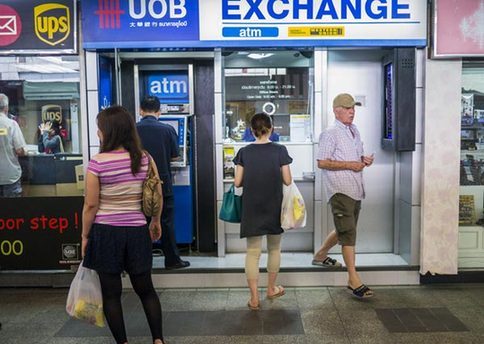A bank in Yunnan province has started to provide direct currency exchanges between Chinese yuan and Thai baht, a move aimed at further opening up Southwest China to Southeast Asia.
Tourism agencies say there is an increasing demand for the Thai currency, with a visa-waiver agreement between China and Thailand in discussion.

People line up to buy Thai Baht at a foreign currency exchange kiosk in Bangkok. [China Daily]
The service, launched on Monday by Fudian Bank, a major commercial bank in the province, allows individuals and enterprises to visit its headquarters to convert yuan into baht by showing their identity cards, said Zhang Jinbin, general manager of the bank's international business department.
"According to the regulations of the State Administration of Foreign Exchange, each citizen can trade yuan worth $50,000 annually at most for foreign currency bills. The counters at our bank will check the exchange balance of each client and make the exchange for them free of charge," Zhang said.
The guideline of the Yunnan-Guangxi Comprehensive Financial Reform Pilot Zone, released in November, said Yunnan province and Guangxi Zhuang autonomous region will launch closer ties with Southeast Asia as a popular area for yuan cross-border settlement in five years.
At the end of August, the State Administration of Foreign Exchange gave approval to Fudian Bank for the cross-border transportation of foreign currency bills. On Dec 27, the first batch of baht was carried to Kunming, ready for clients on Monday.
Zhu Bowei, general manager of the Kunming International Scenic Travel Co Ltd, said the new move will stimulate tourism with Thailand.
In the past 20 years, half of the outbound tourists departing from Yunnan traveled to Thailand. There was a huge demand for baht. Each year, about 150,000 tourists travel from Kunming to Thailand, each spending about 2,000 yuan ($330) on average in the Southeast Asian country, Zhu said.
Travelers used to exchange the two currencies via underground banks or from local tourism guides in Thailand when they landed in the country.
Up until now, travel agencies in Yunnan and Thailand needed to pay each other for each travel group. Direct exchange will make things easier for both sides, said Zhu.
According to media reports, China and Thailand have reached an agreement for a visa-free policy to be signed in the near future. Zhu said it's predicted the number of individual travelers will soar and demand for baht will consequently also rise, Zhu said.
Before that, in June 2011, Fudian Bank started the direct exchange of yuan with Laos kips, saving much time and facilitating enterprise operations between both sides, said Liu Guangxi, director of Yunnan's Financial Office.
In 2012, Fudian's cross-border yuan settlement totaled $311 million. In September, the bank had traded 54 million yuan of baht at the China Foreign Exchange Trading Center in Shanghai.
The next step will involve Yunnan directly trading in other currencies in Southeast Asian countries, including the Vietnamese dong, the Myanmar kyat and the Cambodian riel, Liu said.
Fudian Bank was also granted approval to set up a commercial bank in Laos. The Laos-China Bank will open to customers early this year, said Zhang of Fudian Bank.





